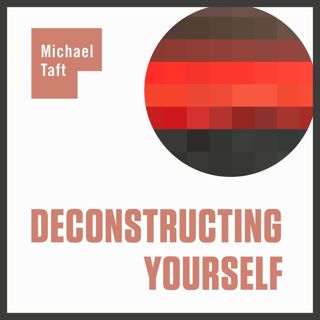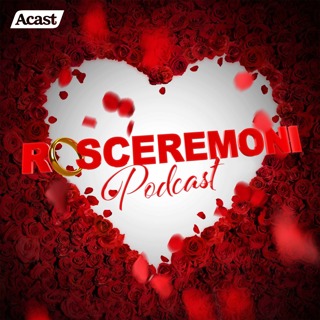
Deconstructing Michael, with Erik Newton
Turning the tables on the usual show format, host Michael Taft gets interviewed by Erik Newton. They talk about the meaning of awakening, the paradox of suffering, the end of seeking, the value of personal experience vs. scriptural understanding, Erik’s awakening experience, new technologies of awakening, the genesis of the Deconstructing Yourself podcast, and more.Erik Newton is a lawyer and was the head of a successful family law firm, which gave him the opportunity to take part in 1000s of divorces. As the result of his experience, two things happened: one was that he created the wildly popular podcast entitled “Together” — the podcast that explores the truth of human relationships — in which Erik uses his hard-won knowledge of the many failure modes of relationships to help couples understand how come together. The second was that he had a major awakening experience.LinksKenneth Folk on DYAm I Mindful Right NowThe Cosmic JokeMasters of OblivionThe Forest Refuge Michael’s Book on Non-DualityDaniel Ingram on DYMeditation Magick Fire KasinaPopping the Bubble of ProjectionMichael’s Article on AwakeningThe Mindful GeekShow Notes3:50 – How The DY Podcast Began6:58 – The Conversation of Awakening as a Creative Journey9:30 – The Joy of Getting Inside Somebody Else’s Mind10:40 – What is “The Path”?12:09 – Where Did the Name “Deconstructing Yourself” Come From?14:48 – Deconstructing Leads to Reconstructing16:13 – Deconstruction and Reconstruction in Buddhism16:57 – Erik’s Awakenings and Emptiness Experiences18:58 – “Heaven is a Place Where Nothing Ever Happens”20:24 – The “What Next” Factor Leads Us Back to The World21:30 – The Pros and Cons of Michael’s Style of Learning and Teaching24:04 – The Value of Academia and Scripture25:24 – Everything is Partially True and False26:43 – Michael’s Time as a Seeker28:00 – What is a Seeker?28:36 – The Slow Death of the Seeker31:02 – Awakening Can Save the World32:36 – Nothing Matters and A Lot Matters34:51 – Does It Hurt to Be Aware of Suffering?36:03 – The Game of Recognizing Emptiness and Engaging Anyway37:37 – Awake People Are Still People38:46 – A Perfect Relationship Doesn’t Exist40:21 – Popping the Bubbles of Projection41:33 – Redefining Awakening Through Science43:06 – Empathizing with Critics43:54 – Teaching for The Western Mind45:42 – The Practical Impact of Awakening46:26 – Plant Medicine as a Shortcut for Awakening47:15 – Technology’s Place in Awakening51:48 – The Power of Communication Technology52:19 – Normalizing Awakening53:46 – Nudges Towards Awakening55:22 – Teaching Meditation at Erik’s Start Up56:33 – Beginner’s Mind57:18 – Goals, Motivations, and Ethics in Meditation58:42 – Waking Up in Silicon Valley You can help to create future episodes of this podcast by contributing through Patreon.See Privacy Policy at https://art19.com/privacy and California Privacy Notice at https://art19.com/privacy#do-not-sell-my-info.
18 Sep 20181h 2min

Emptiness, Liberation, and Beauty, with Rob Burbea
In this episode host Michael Taft speaks with Rob Burbea about Rob’s book, Seeing That Frees, the power of perception (ways of seeing), his creative methods of working with meditation practice, meditating with a more analytical vs more phenomenological focus, how analytical meditation works, Rob’s “soulmaking dharma,” the emptiness of conceptual frameworks, facing the end of life, and the meaning of emptiness.Rob Burbea is a meditation teacher, musician, author, who teaches at Gaia House in Devon, England. Rob is the author of the groundbreaking meditation practice book entitled, Seeing That Frees: Meditations on Emptiness and Dependent Arising. Rob and Michael discuss it at length in this episode.Seeing that Frees on AmazonShow Notes0:24 – Introduction1:49 – Seeing That Frees, the idea of ways of looking that are liberating4:34 – Example of the classical Buddhist anattā way of looking, unhooking identification, and moving towards less fabrication of perception14:14 – Rob’s teachers and how his creative meditative exploration unfolded22:57 – Following the lead of beauty and the sense of liberation into new territory27:01 – What is emptiness?35:10 – An example of analytical meditation on time and its effect on the fading of perception41:38 – Soulmaking, skillful fabrication, and broadening the scope of the purpose of meditation beyond just the release of obvious suffering44:55 – Working with soulmaking and images that are intrapsychic or in the world of material objects, contextualizing these practices, and parallels with meta-rationality48:54 – Gauging the progress of insight into emptiness through palpable senses of relief and release and senses of perception opening up in wondrous and beautiful ways53:12 – On a personal journey of soulmaking through health crises and the possibility of dying1:01:12 – OutroSupport the creation of future episodes of this podcast by contributing through Patreon.See Privacy Policy at https://art19.com/privacy and California Privacy Notice at https://art19.com/privacy#do-not-sell-my-info.
27 Aug 20181h 1min

Walking, Nature, and Engaged Buddhism, with Christopher Titmuss
In this episode, host Michael W. Taft speaks with senior dharma teacher Christopher Titmuss about yatra—meditative pilgrimage without a destination—the power of nature, the importance of deconstructing the self, the psychedelic 60s, Vietnam, engaged Buddhism, the role of spiritual practice in the current world crisis, and the central role of liberation in meditation.Christopher Titmuss is an insight meditation teacher, author, and former Theravada Buddhist monk. He is the co-founder of Gaia House, a large Buddhist retreat center in Devon, England, where he has been teaching since the early 1980s. A renowned proponent of engaged Buddhism, Christopher is the author of numerous books, and twice ran for election as a top Green Party candidate in England. Support the creation of future episodes of this podcast by contributing through Patreon.See Privacy Policy at https://art19.com/privacy and California Privacy Notice at https://art19.com/privacy#do-not-sell-my-info.
14 Aug 201853min

Lucid Dreaming, Meditation, and Consciousness, with Evan Thompson
In this episode, philosopher, author, and meditator, Evan Thompson speaks with host Michael Taft. Topics include: the meaning of awakening; lucid dreaming and noticing the construction of the waking state; the 3-fold structure of Awareness, Contents of Awareness, and then Identification with Contents; The cosmopolitanism of Buddhism, and the myth of Buddhist exceptionalism; consciousness hacking and psychedelics; and much more.Evan Thompson, PhD, works on the nature of the mind, the self, and human experience. His work combines cognitive science, philosophy of mind, phenomenology, and cross-cultural philosophy, especially in Asian traditions. His most recent book, Waking, Dreaming, Being, examines the self and consciousness in neuroscience, meditation, and philosophy.Show Notes1:50 - Evan’s personal practice and retreat in Nelson, British Columbia.4:55 - Central metaphor of awakening from sleep-wake cycle. Fractal nature of awakening.8:50 - Phenomenal sense of insight into waking up, false awakening.11:40 - Is waking up a recurring process as in the ordinary sleep-wake cycle?15:10 - Awakening as metaphorical concept and not a state. Ethics, values tied to awakening.17:15 - Embodied nature of consciousness and awakening.19:55 - Extended consciousness involving brain, body and environment vs panpsychism.23:35 - Meditation is not first person science, more similar to dance and martial arts.28:25 - Basic structure of Waking, Dreaming, Being based on Upanishads.29:05 - Unpacking the Upanishadic structure in the context of meditation.33:45 - Lucid dreaming for cultivating awareness rather than dream control.37:45 - Connection between framing of dream and waking states.38:50 - Consciousness versus contents of consciousness. Sense of self while awake, dreaming.43:25 - Neuroscience of self and memory while dreaming.45:30 - Neuroscience of self and memory while awake.46:20 - Brain as active while asleep as awake, but in different local and network ways.48:00 - Sleep needed for memory consolidation, learning and self regulation.49:35 - Meditation not only limited to brain but an activity practiced in a social context.53:05 - Meditation embodied in a wider context that may be missed in brain only fMRI scans.55:40 - Wings needed for flight but flight is not in the wings, brain needed for meditation …56:55 - Meditation reduced to neuroscience correlates may be too reductionist.58:05 - Neuroscience being used to “prove” Buddhism. Fetishizing Buddhism.1:00:35 - Buddhism is a religion despite claims to the contrary, a lot of Buddhist exceptionalism.1:03:00 - Critique of Buddhist exceptionalism in new book. Cosmopolitan Buddhism preferred.1:05:35 - Evan’s book in progress Why I am not a Buddhist.1:07:05 - Hopeful signs in greater sensitivity to environment, equality.1:10:05 - Unbalanced approach to psychedelics. Consciousness hacking as fear of death.1:13:20 - OutroSupport the creation of future episodes of this podcast by contributing through Patreon.See Privacy Policy at https://art19.com/privacy and California Privacy Notice at https://art19.com/privacy#do-not-sell-my-info.
30 Juni 20181h 13min

Are More People Achieving Stream Entry These Days? with Culadasa
In this episode host Michael Taft speaks with meditation teacher, neuroscientist, and author John Yates, also known as Culadasa. Topics covered include: Are more people achieving stream entry these days?, a clear definition of stream entry, the Buddha’s concept of yathābhūtañāṇadassanaṃ or “seeing things as they really are,” reaching a tipping point of stream enterers to avert the coming world disasters, tips for meditation in action, using consciousness hacking and/or drugs to accelerate insight, paṭiccasamuppāda – the interpenetrating nature of phenomena, quantum entanglement and individual minds, the nondual viewpoint, an explanation of reincarnation and past life experiences, and much more.Culadasa has been practicing Buddhist meditation for over four decades, mainly in Tibetan lineages. He is the director of Dharma Treasure Buddhist Sangha in Tucson, Arizona where he teaches meditation and Buddhism from a modern, progressive scientific perspective. His groundbreaking book, The Mind Illuminated, is a modern road map to Buddhist meditation for a Western audience which combines age-old wisdom teachings of the Buddha with the latest research in cognitive psychology and neuroscience. Learn more at culadasa.com.You can support the creation of future episodes of this podcast by contributing through Patreon.See Privacy Policy at https://art19.com/privacy and California Privacy Notice at https://art19.com/privacy#do-not-sell-my-info.
11 Juni 20181h 21min

Emotions, Stress, and Heartbreak, with Eve Ekman
In this episode emotions researcher and meditation teacher Eve Ekman speaks with Michael W. Taft about embodied emotions, the difference between suppression and healthy expression, impermanence of sensation and moment by moment contact with emotion, emotion-laden cognitions, HH the Dalai Lama, punk rock and Gilman St., surfing, being nice to cats, the Vagus nerve and kundalini, the epidemic of stress and burnout, modern dystopia, struggling with cynicism, the embedded ethnography of heartbreak, and much, much more.Eve Ekman PhD, MSW designs, delivers and evaluates trainings on the development of emotional awareness and the cultivation of deep seated contentment. Eve draws from educations and life experience in clinical social work, integrative medicine and contemplative practice. Eve is a second generation emotion researcher and has had meaningful collaborations with her father, renowned emotion researcher Dr. Paul Ekman. Their most recent project, The Atlas of Emotions, is an online visual tool to teach emotional awareness, a project commissioned and supported by the Dalai Lama. Eve is a founding teacher for Cultivating Emotional Balance, an evidenced based training with a rich contemplative science lineage of Western and Eastern approaches to emotional and genuine happiness.eveekman.comatlasofemotions.org You can support the creation of future episodes of this podcast by contributing through Patreon.See Privacy Policy at https://art19.com/privacy and California Privacy Notice at https://art19.com/privacy#do-not-sell-my-info.
29 Maj 20181h 28min

Why Good Teachers Go Bad, with Shinzen Young
In this special one-year anniversary episode, Shinzen Young talks with host Michael W. Taft about becoming a meditation teacher, the unrealistic paradigm about what meditation delivers, Shinzen’s codependency disaster, Bill Hamilton, the great unsung hero of vipassana in the Western world, homology theory, how science can influence meditation in the West, sociopathic teachers, and what we can do to make sure that good teachers don’t go bad. Who is a teacher? What’s the family test? These questions and more.Shinzen Young is an American mindfulness teacher and neuroscience research consultant.His systematic approach to categorizing, adapting and teaching meditation, known as Unified Mindfulness, has resulted in collaborations with Harvard Medical School, Carnegie-Mellon University, and the University of Vermont in the burgeoning field of contemplative neuroscience. You can learn more about Shinzen on his website shinzen.org.Show Notes1:40 – Shinzen Intro3:00 – Shinzen talks about Homology Theory7:50 – Meditation and science complement each other like algebra and geometry9:30 – Coupling of science and contemplative practice12:50 – What science can teach contemplative practice13:49 – In some ways scientists have less ego than meditation masters15:50 – All meditators are teachers20:55 – Ability of a “professional meditation teacher” to lead students through all goals24:24 – Why meditation teachers should have respectful but open and unhurried dialog to improve the field36:44 – Improving science by reducing ego in other ways via Meditation38:25 – The contradiction of advanced meditators exhibiting unacceptable behavior42:44 – The high profile flagrant behavior of a few tends to overshadow the overall positive impact of practice46:30 – What’s missing in the case of advanced meditators who go morally off track59:30 – Unrealistic paradigms of what liberation and meditation delivers and how it’s possible to do wrong from a place of emptiness1:10:20 – Role/Power of a meditation teacher and culture1:16:01 – Plane crash analogy and Shinzen’s story of going off-track1:21:40 – The feedback that helped Shinzen fix co-dependence1:24:50 – Bill Hamilton, “the great unsung hero of vipassana in the West” Support the creation of future episodes of this podcast by contributing through Patreon.See Privacy Policy at https://art19.com/privacy and California Privacy Notice at https://art19.com/privacy#do-not-sell-my-info.
18 Maj 20181h 28min

Deconstructing Dependent Arising, with Leigh Brasington
Leigh Brasington speaks with host Michael W. Taft about Dependent Arising. Dependent Arising, also called Dependent Origination, is a Buddhist theory of reality that is famously complex, arcane, important, and fascinating. In this episode they discuss early Buddhist metaphysics, Pratītyasamutpāda—the “curious old rune”, the four noble truths version of Dependent Arising, the Vedic Hymn of Creation, Leigh’s model of SODAPI (Streams of Dependently Arising Processes Interacting), and how to use the teaching of Dependent Arising in practice and in life.Leigh Brasington has been practicing meditation for decades and is the senior American student of the late Venerable Ayya Khema. Leigh began assisting her in 1994, and began teaching retreats on his own in 1997. He teaches in Europe and North America and is the author of the book Right Concentration: A Practical Guide to the Jhanas. Find more about Leigh’s teaching and schedule at leighb.com. Support the creation of future episodes of this podcast by contributing through Patreon.See Privacy Policy at https://art19.com/privacy and California Privacy Notice at https://art19.com/privacy#do-not-sell-my-info.
29 Apr 20181h





















